
DNA Test Genetic testing, also known as DNA testing, allows the genetic diagnosis of vulnerabilities to inherited diseases, and can also be used to determine a child's parentage (genetic mother and father) or in general a person's ancestry or biological relationship between people. In addition to studying chromosomes to the level of individual genes, genetic testing in a broader sense includes biochemical tests for the possible presence of genetic diseases, or mutant forms of genes associated with increased risk of developing genetic disorders. Genetic testing identifies changes in chromosomes, genes, or proteins.
TMT(Tread Mill Test) Cardiac(TMT) stress tests compare the coronary circulation while the patient is at rest with the same patient's circulation during maximum physical exertion, showing any abnormal blood flow to the myocardium (heart muscle tissue).
Ultrasound This uses sound waves to 'see' your organs. A microphone is passed over the part of the body to be scanned and the returning sound waves are feed into a computer which then builds up an image of your internal organs and tissues. Occasionally the microphone needs to be inserted into your body to get a better picture - this can be the case when the prostate or ovaries need to be visualised, for example.
Echocardiogram Echocardiogram, often referred to as a cardiac echo or simply an echo, is a sonogram of the heart. (It is not abbreviated as ECG, an abbreviation for an electrocardiogram.) Echocardiography uses standard two-dimensional, three-dimensional, and Doppler ultrasound to create images of the heart.
Blood tests Blood tests are often used in health care to determine physiological and biochemical states, such as disease, mineral content, pharmaceutical drug effectiveness, and organ function.
EEG EEG is most often used to diagnose epilepsy, which causes abnormalities in EEG readings.It is also used to diagnose sleep disorders, coma, encephalopathies, and brain death. EEG used to be a first-line method of diagnosis for tumors, stroke and other focal brain disorders.
Nerve conduction study A nerve conduction study (NCS) is a medical diagnostic test commonly used to evaluate the function, especially the ability of electrical conduction, of the motor and sensory nerves of the human body.
Electrocardiography ECG is the process of recording the electrical activity of the heart over a period of time using electrodes placed on a patient's body.
Doppler study which can be used to measure blood flow velocities within the cervical carotid arteries, as well as the vertebral arteries and sometimes the subclavian arteries by means of non-invasive ultrasonic scanning in which the Doppler effect is utilized.